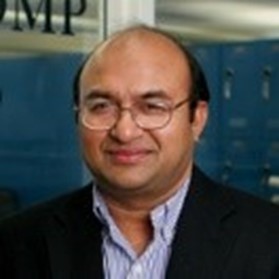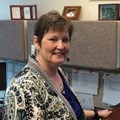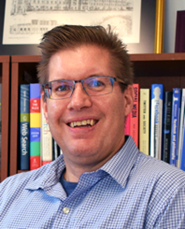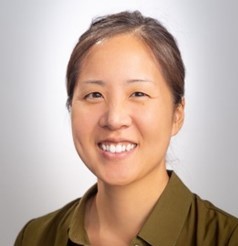IEEE Services 2020 Plenary Events
The Future of Home, Office, School in the Age of Pandemic
| Title: | The Future of Home, Office, School in the Age of Pandemic |
| Date/Time: | Wednesday October 21, 20:00-20:40 UTC |
| Summary: | The COVID-19 pandemic is impacting nearly all aspects of our daily lives: living, working, learning, entertaining, adventuring, and even our moments of happiness and grieving. Most especially our traditional lifestyles on all their variations are being challenged and forced to change. Our living environments - residences, offices, schools, and healthcare clinics and hospitals - have changed dramatically to cope with the Coronavirus and protect our lives and the lives of those around us. We must be prepared to change in order to save ourselves from this and future pandemics. We have learned from this and past pandemics that social distancing, hand washing, mask wearing are simple but essential rules that must be followed. But how can technology help in enforcement, adherence, awareness and acceptability of such rules? And how can technology empower and assist individuals, families, school children, college students, communities, small business owners, and large enterprise cope with radical changes in lifestyle? Perhaps, critically important are vulnerable groups including older adults, individuals with special needs, and those living with long term conditions; how can technology include an equitable support for those groups often facing limited access to technology and its potential benefits. This panel aims to explore different approaches to new realities and requirements in environmental design of home, work and school, and community and societal level health and safety adaptations. The panel will seek to identify key challenges ahead of humanity and how computing technologies can help. It is expected that the audience will challenge the panelists for their wisdom in defining the new norm of lifestyles and obstacles that must be overcome. The panel chair will give a brief introduction to the panel objective and panelists. Panelists will take turns to share brief opening remarks with the audience. Then, the audience will be invited to interact with the panel to ask questions, or offer their own experiences, opinions and insights. |
| Panel Chair: |  Sheikh Iqbal Ahamed, Marquette University Sheikh Iqbal Ahamed, Marquette University Sheikh Iqbal Ahamed is a professor and Chair of Computer Science and director of Ubicomp lab at Marquette University, USA. He is a senior member of the IEEE, ACM, and the IEEE Computer Society. He completed his Ph.D. in Computer Science from Arizona State University, USA in 2003. His research interests include mHealth, affective computing, non-intrusive technologies. He is active in system and application development of mHealth projects for Native American, Hispanic community and other underserved populations like Nepal, Bangladesh. Most of his mHealth projects are supported by NIH, Industry and Philanthropic organizations. He has published 200+ peer reviewed journal, conference and workshop papers. He has received twelve best paper/posters awards in last five years. Dr. Ahamed serves regularly on international conference program committees in software engineering and pervasive computing such as COMPSAC, PERCOM and SAC . He has been serving as the Standing Committee Vice Chair of IEEE COMPSAC(compsac.org), which is a signature conference of IEEE since 2015. He is the Guest Editor of Computer Communications Journal, Elsevier. |
| Panelist: |  Wendy Nilsen, National Science Foundation Wendy Nilsen, National Science Foundation Wendy Nilsen, Ph.D. is in the Program Director in the Computer and Information Science and Engineering Directorate at NSF. She is also the lead Program Director in the Smart and Connected Health program. Her work focuses on the intersection of computing and human functioning. Her interests span the areas of sensing, analytics, cyber-physical systems, information systems, machine learning, artificial intelligence and robotics. More specifically, her efforts include: serving as cochair of the Health Information Technology Research and Development working group of the Networking and Information Technology Research and Development Program; the lead for the NSF/NIH Smart and Connected Health announcement; convening workshops to address methodology in technology in health research; and, serving on numerous federal technology initiatives. Prior to joining NSF, Wendy was at the National Institutes of Health. |
| Panelist: |  Cheng-Chung (William) Chu, Tunghai University Cheng-Chung (William) Chu, Tunghai University WILLIAM CHENG-CHUNG CHU received the M.S. and Ph.D. degrees in computer science fromNorthwestern University, Evanston, IL, USA, in1987 and 1989, respectively. He is currently a Distinguished Professor with the Department ofComputer Science, Tunghai University, Taichung,Taiwan, where he had served as the Director of Software Engineering and Technologies Centerfrom 2004 to 2016 and as the Dean of Research and Development office from 2004 to 2007. From 1994 to 1998, he was the Dean of Engineering College and an Associate Professor with the Department of Information Engineering and Computer Science, Feng Chia University. He was a Research Scientist with the Software Technology Center, Lockheed Missiles and Space Company, Inc.In 1992, he was also a Visiting Scholar with Stanford University. He has edited several books and authored or coauthored more than 100 referred papers and book chapters, as well as participated in many international activities, including organizing international conferences, serving as the steering committee for the IEEE Computer Society Signature Conference on Computers, Software and Applications, the Asia-Pacific Software Engineering Conference, the IEEE International Conference on Software Quality, Reliability and Security, the International Symposium on System and Software Reliability, and the program committee of more than 70 international conferences. His current research interests include software engineering artificial intelligence and big data analytics. Prof. Chu was the recipient of special contribution awards in both 1992 and 1993 and a PIP Award in 1993 at Lockheed Missiles and Space Company, Inc. He is an Associate Editor for the IEEE TRANSACTIONS ON RELIABILITY, the Journal of Software Maintenance and Evolution, the International Journal of Advancements in Computing Technology, and the Journal of Systems and Software. |
| Panelist: |  Hemant Jain, The University of Tennessee-Chatanooga Hemant Jain, The University of Tennessee-Chatanooga Hemant Jain is W. Max Finely Chair in Business, Free Enterprise and Capitalism and professor of Data Analytics, in Gary W. Rollins College of Business at University of Tennessee Chattanooga. His areas of interest are Business Analytics, Text Mining and Machine Learning, Big Data Management, Healthcare IT and Service Oriented Architecture. His work has appeared in leading journals including Information Systems Research, MIS Quarterly, IEEE Transactions on Software Engineering, Journal of MIS, IEEE Transactions on Systems Man and Cybernetics, Naval Research Quarterly, Decision Sciences, Decision Support Systems, Communications of ACM, and Information & Management. He received IEEE Technical Committee on Service Computing Outstanding Leadership Award. He is a member of Steering Committee for IEEE Transactions on Big Data. He is co-editing a Special Issue of Information Systems Research on Humans, Algorithms, and Augmented Intelligence: The Future of Work, Organizations, and Society. He served as Associate Editor-in-Chief of IEEE Transactions on Services Computing and Associate Editor of Journal of AIS. He received his Ph. D. in information system from Lehigh University, a Master of Technology from Indian Institute of Technology, Kharagpur, India and Bachelor of Engineering from University of Indore, India. |
| Panelist: |  Michael Zimmer, Marquette University Michael Zimmer, Marquette University Michael Zimmer, PhD, is an associate professor in the Department of Computer Science at Marquette University, where he also serves as the Director of Undergraduate Studies, Co-Director of the Interdisciplinary Data Science major, and Director of the Graduate Data Science Certificate. With a multidisciplinary background in communication & Internet studies, science & technology studies, and information policy & ethics, Dr. Zimmer studies the social and ethical dimensions of our contemporary digital ecosystem, with particular interest in digital privacy, data ethics, internet research ethics, and how users understand information flows within and across digital platforms. His research agenda has included investigations into web search engines, social media platforms, wearable fitness trackers, intelligent personal assistants, library technologies, autonomous vehicles, and other emerging technologies. Dr. Zimmer has engaged in research supported by the National Science Foundation, the National Institute of Health, and the Institute of Museum and Library Services. |
| Panelist: |  Kathy Chang, University of New Mexico and Engeye Kathy Chang, University of New Mexico and Engeye Kathy Z. Chang is an Associate Residency Program Director and Assistant Clinical Professor in the Department of Family and Community Medicine at the University of New Mexico, USA. She is the current President of the Board of Directors for Engeye, Inc., a 501(c)3 non-profit organization supporting Engeye Health Clinic and the Engeye Scholars program in rural Uganda. She is a member of the Society of Teachers of Family Medicine and the current Communications Chair for the Global Health Educators Collaborative. She completed her M.D. and residency in Family Medicine at the University of Illinois College of Medicine in Peoria, IL, her M.P.H. in population and community health through the University of Illinois at Chicago School of Public Health, and is a Fellow of the American Academy of Family Physicians. Her current clinical practice includes outpatient primary care and inpatient hospital coverage on the family medicine teaching service, including precepting residents and medical students. Her interests include global health equity, practice management, electronic medical record optimization, and she serves as the Clinical Documentation Improvement (CDI) department champion. Her work with Engeye includes development and ongoing maintenance of the open source electronic medical record system (OCEMR) used on site since 2011, serving on-site as the Director of Clinical Services from 2011-2013, and implementation of ongoing clinical education via messaging apps and now teleconferencing platforms. |